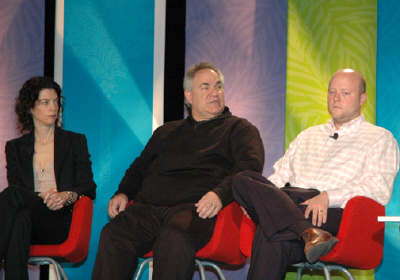Is the Web the new Hollywood?

"The audience is taking over the programming," according to Ted Cohen,senior vice president of Digital Development and Distribution at EMI Music. "A few years ago we looked at litigating it, now we are looking at how to monetize it."
In the last several months, hundreds of video sites have shown up on the Web. However, the big entertainment companies, who fear loss of control, will need to let go to participate in the new
media world, Cohen said. With or without permission, users are playing with the video and other content assets--from trailers to full length features--of entertainment companies.

From left: Jennifer Feikin (Google), Ted Cohen (EMI Music), Jeremy Allaire (Brightcove)
"You can't set up too many rules right now....if you don't let them play they will play anyway, so we have to figure out how to monetize it," he said. Rights are a complicated issue, he said, but the rights holders have to have the right "mindset." For example, directors and producers making B-roll and samples available to the masses to mashup, and hoping that MySpace or YouTube users become unsolicited viral marketing agents.
Cohen was speaking on an OnHollywood panel that also included Jeremy Allaire, CEO of Brightcove; Jennifer Feikin, director of Google Video; Erik Flannigan, vice president and general manager of Entertainment Programming at AOL; and Jeff Karnes, director of Multimedia Search at Yahoo. J.D. Lasica, co-founder of Ourmedia, was the moderator.
The panelists don't expect user-generated content to displace the content produced by networks, studios and independent producers. Allaire noted that producing good content costs lots of money,
and also requires marketing, branding and building an audience.
Feikin agreed that most of user-generated content isn't going to be good, but pointed to the community aspect of the phenomenon. "Much of what is on the Internet is now a novelty, but it has an additional way to express and communication that wasn't there before. It's also a good way to find content, but it needs to be good content. It's not just about the distribution. More content is being created, but the best content is what will be watched," Feikin said.
In terms of what kind of video content works on the Web, Feikin said, "Come back in a year...the whole revolution is only eight months old. We really don't know what will work. Today it's short form comedy and video content, very PC-based." Down the road, video will spread out to more kinds of mobile devices, and the "whole long tail of content" will open up, she added. At the other end of the tail, the entertainment industry is bring more longer form content, such as TV shows, to the Web.
From left: Jeff Karnes (Yahoo), Erik Flannigan (AOL), Jennifer Feikin (Google), Ted Cohen (EMI Music), Jeremy Allaire (Brightcove), J.D. Lasica (Ourmedia)
One major difference with the Internet is that reduction of scarcity is happening on a massive scale, Allaire said, and it is becoming more efficient to serve micro-markets. The issue of distribution control came up. Allaire said the most networks--such as MTV, Discovery, and Turner--would rather distribute themselves than ceding it to another gatekeeper. "How to get syndication and aggregation is not figured out," he said.
AOL's Flannigan said that having control of the context around a video, wrapping it with a community experience, is key for the networks and other content owners. He also lamented the lack of a good mechanism to attract casual viewers. "There isn't a seductive barker channel to get people online," he said.